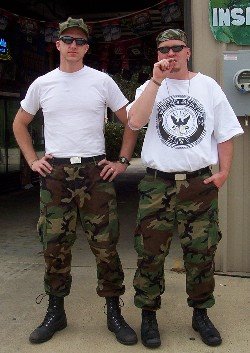
A few more interesting passages from the Hagakure ...
A Samurai with no group and no horse is not a samurai at all.
p. 32
In China there once was a man who liked pictures of dragons, and his clothing and furnishings were all designed accordingly. His deep affection for dragons was brought to the attention of the dragon god, and one day a real dragon appeared before his window. It is said that he died of fright. He was probably a man who always spoke big words but acted differently when facing the real thing.
p. 38
There is a way of bringing up the child of a samurai. From the time of infancy one should encourage bravery and avoid trivilally frightening or teasing the child. If a person is affected by cowardice as a child, it remains a lifetime scar. It is a mistake for parents to thoughtlessly make their children dread lightening, or to have them not go into dark places, or to tell them frightening things in order to stop them from crying. Furthermore, a child will become timid if he is scolded severely.
One should not allow bad habits to form. After a bad habit is ingrained, although you admonish the child he will not improve. As for such things as proper speaking and good manners, gradually make the child aware of them. Let him not know avariance. Other than that, if he is of normal stature, he should develop wll by the way he is brought up.
Moreover, the child of parents who have a bad relationship will be unfillial. This is natural. Even the birds and beasts are affected by what they are used to seeing and hearing from the time they are born. Also, the relationship between father and child may deteriorate because of a mother's foolishness. A mother loves her child above all things, and will be partial to the childn who is corrected by his father. If she becomes the child's ally, there will be discord between father and son. Because of the shallowness of her mind, a woman sees the chld as her support in old age.
P. 40
To hate injustice and stand on righteousness is a difficult thing. Furthermore, to think that being righteous is the best you can do and to do one's utmost to be righteous will, on the contrary, bring many mistakes. The Way is a higher place then righteousness. This is very difficult to discover, but it is the highest wisdom. When seen from this standpoint, things like righteousness are rather shallow. If one does not understand this on his own, it cannot be known. There is a method of getting to this Way, however, even if one cannot discover it by himself. This is found in consulting with others. Even a person who has not attained the Way sees others from the side. It is like the saying from the game of go: "He who sees from the side has eight eyes." The saying, "Thought by thought, we see our own mistakes", also means that the highest Way is in discussions with others. Listening to the old stories and reading books are for the purpose of sloughing off one's own discriminations and attaching oneself to that of the ancients.
p.26
It's this last quote that reminded me most of the Bible. Though the "Way" spoke of is the Way of the Samurai - Bushido ... I find some applicable parallels to the Bible as the Way in these words. I was first reminded of Romans, Chapter 7.
7What shall we say, then? Is the law sin? Certainly not! Indeed I would not have known what sin was except through the law. For I would not have known what coveting really was if the law had not said, "Do not covet."8 But sin, seizing the opportunity afforded by the commandment, produced in me every kind of covetous desire. For apart from law, sin is dead. 9Once I was alive apart from law; but when the commandment came, sin sprang to life and I died. 10I found that the very commandment that was intended to bring life actually brought death.
11For sin, seizing the opportunity afforded by the commandment, deceived me, and through the commandment put me to death. 12So then, the law is holy, and the commandment is holy, righteous and good. 13Did that which is good, then, become death to me? By no means! But in order that sin might be recognized as sin, it produced death in me through what was good, so that through the commandment sin might become utterly sinful.
14We know that the law is spiritual; but I am unspiritual, sold as a slave to sin. 15I do not understand what I do. For what I want to do I do not do, but what I hate I do. 16And if I do what I do not want to do, I agree that the law is good. 17As it is, it is no longer I myself who do it, but it is sin living in me. 18I know that nothing good lives in me, that is, in my sinful nature.[c] For I have the desire to do what is good, but I cannot carry it out. 19For what I do is not the good I want to do; no, the evil I do not want to do—this I keep on doing. 20Now if I do what I do not want to do, it is no longer I who do it, but it is sin living in me that does it.
21So I find this law at work: When I want to do good, evil is right there with me. 22For in my inner being I delight in God's law; 23but I see another law at work in the members of my body, waging war against the law of my mind and making me a prisoner of the law of sin at work within my members. 24What a wretched man I am! Who will rescue me from this body of death? 25Thanks be to God—through Jesus Christ our Lord! So then, I myself in my mind am a slave to God's law, but in the sinful nature a slave to the law of sin.
I then thought of this passage
All of us have become like one who is unclean, and all our righteous acts are like filthy rags; we all shrivel up like a leaf, and like the wind our sins sweep us away. (Isaiah 64:6)
For the sake of brevity ~laughs~ I'll not include the entire text of an interesting page I found but will reference it here, for any who are interested - Filthy Rags
Basically what I thought was interesting is the fact that the samurai, Yamamoto Tsunetomo comes to the same conclusion in some respects as the writers of the Bible. In our own strength ... in our own way ... righteousness apart from God -- THE WAY is not enough. Even someone who doesn't know the Lord can see the Lord in us. Can learn of the Lord THROUGH us ... and can come to learn of THE TRUE WAY. Our own indignation at injustice is not enough nor is our own resolve to do what is right. Invariably ... we fail on our own power when it comes to executing righteousness. THE WAY of the Lord is far above our righteousness and often defies our understanding ... consider Cubbie's discussions on Dark Grace or Helen's ponderings of the Lord's directives.
While I don't subscribe to the believe that the highest Way is in discusisons with others ... I do agree that discussion can be challenging and enlightening in terms of understanding what the Lord is saying to us and in hearing His voice. It can also come by personal enlightenment however, sometimes our discussions based on personal enlightenment can round out what we believe that the Lord is privately speaking to us. And of course lastly, reading the Bible and scholars of the past is our way of putting off our own discriminations and learning THE WAY that those who walked with the Lord understood.
Just a little food for thought ...
A Samurai with no group and no horse is not a samurai at all.
p. 32
In China there once was a man who liked pictures of dragons, and his clothing and furnishings were all designed accordingly. His deep affection for dragons was brought to the attention of the dragon god, and one day a real dragon appeared before his window. It is said that he died of fright. He was probably a man who always spoke big words but acted differently when facing the real thing.
p. 38
There is a way of bringing up the child of a samurai. From the time of infancy one should encourage bravery and avoid trivilally frightening or teasing the child. If a person is affected by cowardice as a child, it remains a lifetime scar. It is a mistake for parents to thoughtlessly make their children dread lightening, or to have them not go into dark places, or to tell them frightening things in order to stop them from crying. Furthermore, a child will become timid if he is scolded severely.
One should not allow bad habits to form. After a bad habit is ingrained, although you admonish the child he will not improve. As for such things as proper speaking and good manners, gradually make the child aware of them. Let him not know avariance. Other than that, if he is of normal stature, he should develop wll by the way he is brought up.
Moreover, the child of parents who have a bad relationship will be unfillial. This is natural. Even the birds and beasts are affected by what they are used to seeing and hearing from the time they are born. Also, the relationship between father and child may deteriorate because of a mother's foolishness. A mother loves her child above all things, and will be partial to the childn who is corrected by his father. If she becomes the child's ally, there will be discord between father and son. Because of the shallowness of her mind, a woman sees the chld as her support in old age.
P. 40
To hate injustice and stand on righteousness is a difficult thing. Furthermore, to think that being righteous is the best you can do and to do one's utmost to be righteous will, on the contrary, bring many mistakes. The Way is a higher place then righteousness. This is very difficult to discover, but it is the highest wisdom. When seen from this standpoint, things like righteousness are rather shallow. If one does not understand this on his own, it cannot be known. There is a method of getting to this Way, however, even if one cannot discover it by himself. This is found in consulting with others. Even a person who has not attained the Way sees others from the side. It is like the saying from the game of go: "He who sees from the side has eight eyes." The saying, "Thought by thought, we see our own mistakes", also means that the highest Way is in discussions with others. Listening to the old stories and reading books are for the purpose of sloughing off one's own discriminations and attaching oneself to that of the ancients.
p.26
It's this last quote that reminded me most of the Bible. Though the "Way" spoke of is the Way of the Samurai - Bushido ... I find some applicable parallels to the Bible as the Way in these words. I was first reminded of Romans, Chapter 7.
7What shall we say, then? Is the law sin? Certainly not! Indeed I would not have known what sin was except through the law. For I would not have known what coveting really was if the law had not said, "Do not covet."8 But sin, seizing the opportunity afforded by the commandment, produced in me every kind of covetous desire. For apart from law, sin is dead. 9Once I was alive apart from law; but when the commandment came, sin sprang to life and I died. 10I found that the very commandment that was intended to bring life actually brought death.
11For sin, seizing the opportunity afforded by the commandment, deceived me, and through the commandment put me to death. 12So then, the law is holy, and the commandment is holy, righteous and good. 13Did that which is good, then, become death to me? By no means! But in order that sin might be recognized as sin, it produced death in me through what was good, so that through the commandment sin might become utterly sinful.
14We know that the law is spiritual; but I am unspiritual, sold as a slave to sin. 15I do not understand what I do. For what I want to do I do not do, but what I hate I do. 16And if I do what I do not want to do, I agree that the law is good. 17As it is, it is no longer I myself who do it, but it is sin living in me. 18I know that nothing good lives in me, that is, in my sinful nature.[c] For I have the desire to do what is good, but I cannot carry it out. 19For what I do is not the good I want to do; no, the evil I do not want to do—this I keep on doing. 20Now if I do what I do not want to do, it is no longer I who do it, but it is sin living in me that does it.
21So I find this law at work: When I want to do good, evil is right there with me. 22For in my inner being I delight in God's law; 23but I see another law at work in the members of my body, waging war against the law of my mind and making me a prisoner of the law of sin at work within my members. 24What a wretched man I am! Who will rescue me from this body of death? 25Thanks be to God—through Jesus Christ our Lord! So then, I myself in my mind am a slave to God's law, but in the sinful nature a slave to the law of sin.
I then thought of this passage
All of us have become like one who is unclean, and all our righteous acts are like filthy rags; we all shrivel up like a leaf, and like the wind our sins sweep us away. (Isaiah 64:6)
For the sake of brevity ~laughs~ I'll not include the entire text of an interesting page I found but will reference it here, for any who are interested - Filthy Rags
Basically what I thought was interesting is the fact that the samurai, Yamamoto Tsunetomo comes to the same conclusion in some respects as the writers of the Bible. In our own strength ... in our own way ... righteousness apart from God -- THE WAY is not enough. Even someone who doesn't know the Lord can see the Lord in us. Can learn of the Lord THROUGH us ... and can come to learn of THE TRUE WAY. Our own indignation at injustice is not enough nor is our own resolve to do what is right. Invariably ... we fail on our own power when it comes to executing righteousness. THE WAY of the Lord is far above our righteousness and often defies our understanding ... consider Cubbie's discussions on Dark Grace or Helen's ponderings of the Lord's directives.
While I don't subscribe to the believe that the highest Way is in discusisons with others ... I do agree that discussion can be challenging and enlightening in terms of understanding what the Lord is saying to us and in hearing His voice. It can also come by personal enlightenment however, sometimes our discussions based on personal enlightenment can round out what we believe that the Lord is privately speaking to us. And of course lastly, reading the Bible and scholars of the past is our way of putting off our own discriminations and learning THE WAY that those who walked with the Lord understood.
Just a little food for thought ...










2 comments:
Christianity is the religion of the west, not a western religion. There are profound insights to be gained from Eastern philosophies that resonate deeply with historical Christianity. The ones who wrote about these commonalities are now called "mystics" in Christian tradition. Often shunned by Evangelicalism, they stand in stark contrast to the Christianity of post Enlightenment Modernity. Keep it up Caroline. I love the way you are thinking!
Reed, thank you so much for your response. i have missed reading your words of late ... You truly have NO idea how much i take from just a few words from you. Thanks for letting me know you are -still here- ... ~grins~ my best to your family ...
C
Post a Comment